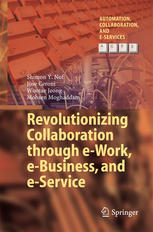

Most ebook files are in PDF format, so you can easily read them using various software such as Foxit Reader or directly on the Google Chrome browser.
Some ebook files are released by publishers in other formats such as .awz, .mobi, .epub, .fb2, etc. You may need to install specific software to read these formats on mobile/PC, such as Calibre.
Please read the tutorial at this link: https://ebookbell.com/faq
We offer FREE conversion to the popular formats you request; however, this may take some time. Therefore, right after payment, please email us, and we will try to provide the service as quickly as possible.
For some exceptional file formats or broken links (if any), please refrain from opening any disputes. Instead, email us first, and we will try to assist within a maximum of 6 hours.
EbookBell Team

0.0
0 reviewsCollaboration in highly distributed organizations of people, robots, and autonomous systems is and must be revolutionized by engineering augmentation. The aim is to augment humans’ abilities at work and, through this augmentation, improve organizations’ abilities to accomplish their missions. This book establishes the theoretical foundations and design principles of collaborative e-Work, e-Business and e-Service, their models and applications, design and implementation techniques. The fundamental premise is that without effective e-Work and e-Services, the potential of emerging activities, such as e-Commerce, virtual manufacturing, tele-robotic medicine, automated construction, smart energy grid, cyber-supported agriculture, and intelligent transportation cannot be fully materialized. Typically, workers and managers of such value networks are frustrated with complex information systems, originally designed and built to simplify and improve performance. Even if the human-computer interface for such systems is well designed, the information and task overloads can be overwhelming. Effective delivery of expected outcomes may not occur. Challenges and emerging solutions in the context of the recently developed CCT, Collaborative Control Theory, are described, with emphasis on issues of computer-supported and communication-enabled integration, coordination and augmented collaboration. Research results and analyses of engineering design methods and complex systems management techniques are explained and illustrated.